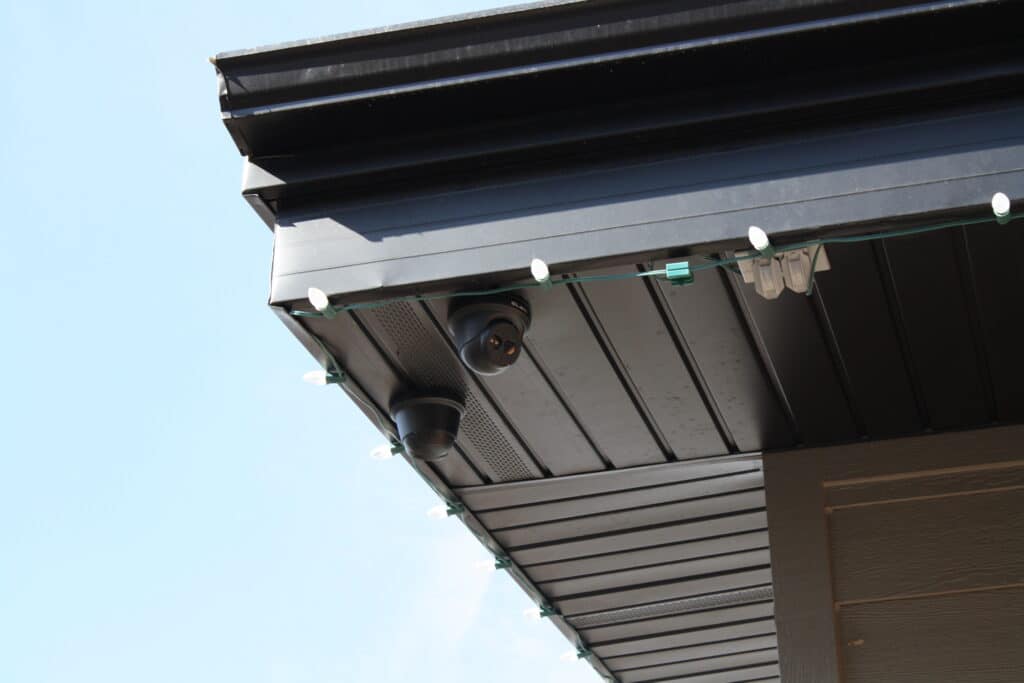When it comes to securing your home, you seemingly have two options: wireless vs wired security systems. Both systems have their advantages and disadvantages, but together they’re unrivaled. This blog post will explore the benefits of each system and why you should consider having both security systems in your home.
Defining Wireless vs Wired Home Security
Before we get into the benefits of each system, let’s first define what we mean by “wired” and “wireless.”
Wireless home security systems use battery-powered sensors that communicate with the main panel via radio frequencies. Wired home security systems, on the other hand, are those that have sensors that are hardwired into the main panel.
Because wired security systems are hardwired into your home’s electrical system, they’re always on and can’t be turned off without cutting the power to your entire home. Meanwhile, wireless security systems can be turned off by simply removing the batteries.
Wired Home Security Systems
A wired home security system is a great way to deter burglars and keep your family safe. But what exactly is a wired home security system? And how can you integrate one into your home, whether you’re building from scratch or retrofitting an existing property?
A wired home security system is, simply put, a system of wires and sensors that are connected to a central control panel. The control panel is usually located in a central location in the home, such as the kitchen or living room. From here, you can arm and disarm the system and monitor activity. Sensors are usually located on doors and windows, and they can be set to trigger an alarm when they detect movement. In some cases, cameras may also be integrated into the system.
Benefits of Wired Home Security Systems
With a robust and reliable connection to the main panel, hardwired home security systems offer various benefits; let’s explore some of these advantages in more detail.
Perfect for Large Homes & Properties
Wired home security systems are perfect for large homes and properties. They can cover a large area and easily expand to accommodate additional sensors or cameras. They’re also less likely to experience signal interference, which can be a problem with wireless systems.
Great for New Construction & Renovations
If you’re building a new home or renovating an existing property, wired home security systems are the way to go. This is because they can be easily integrated into the electrical system during construction. And if you’re renovating, the wiring is usually already in place, so it’s a relatively easy and cost-effective upgrade.
Eliminates Electrical Interference
One of the main advantages of wired home security systems is eliminating electrical interference. The signals are hardwired into the main panel, so power outages or electromagnetic fields can’t disrupt them. This way, you can have as many devices as you want on the system without worrying about signal strength.
Ensures Consistent Monitoring
Another advantage of wired home security systems is that they ensure consistent monitoring. This is because a wired network’s sensors are always powered and can’t be turned off, so you can be sure that your home is protected 24/seven.
Harder for Hackers to Tap Into
Wired home security systems are also harder for hackers to tap into. This is because the system is not reliant on a wireless signal, which can be intercepted. And even if a hacker were able to access the wires physically, they would still need to know the specific codes and wires to disable the system.
Feature Rich System
Wired home security systems are feature-rich and offer a variety of features and benefits. Here are just a few of the features you can expect with a wired system:
- Central control panel for easy arming and disarming
- Sensors on doors and windows to detect movement
- Integration with existing electrical systems
- Cameras to monitor activity
While wired security systems offer a variety of benefits, they’re not right for every home. Let’s look at some of the disadvantages of wired home security systems.
Disadvantages of Wired Home Security Systems
There are a few disadvantages to wired home security systems, including:
More Expensive Upfront Cost
One of the main disadvantages of wired home security systems is the upfront cost. The system needs professional installation, and the equipment can be more expensive than wireless options. For example, wired security cameras can cost several hundred dollars each, whereas wireless cameras range in price.
Difficult to Install & Maintain
Another drawback of wired home security systems is that they can be difficult to install and maintain. The wires need to run through your walls and ceilings, which can challenge DIYers. And if any of the sensors or cameras sustain damage, they will need replacement by a professional.
Less Flexibility in Placement
Wired home security systems are also less flexible in terms of placement. This is because the sensors and cameras need to be physically connected to the main panel, limiting where they can be placed. Though you can add them to different areas of your home, you may need to hire a professional to run new wires.
Wireless Home Security Systems
Wireless home security systems are a newer option for protecting residences. These systems do not require any wiring to run through the home, making them much easier and less expensive to install than traditional security systems. Additionally, wireless systems use radio frequency signals to communicate between the various components. The signals are sent from the sensors to a central control panel, which then sounds the alarm or activates the cameras if there is an intrusion.
Wireless home security systems typically consist of sensors, a control panel, and a monitoring service. These sensors are placed around the perimeter of the home, and they detect when a window or door is opened. The control panel is the brain of the system, and it is responsible for sending alerts to the monitoring service when a sensor is triggered. The monitoring service will then contact the homeowner to let them know that there has been an intrusion.
Wireless home security systems offer many benefits that differ from a traditional home security system. Let’s look at some of the advantages and disadvantages of wireless home security systems.
Benefits of Wireless Home Security Systems
There are several advantages to wireless home security systems, including:
Easier Installation
One of the biggest advantages of wireless home security systems is that they are much easier to install. There is no need to run any wires through the home. The sensors can be placed anywhere, and they will still communicate with the control panel. Additionally, wireless systems are battery-operated, so you don’t have to worry about running power to the sensors.
More Flexibility in Placement
Another advantage of wireless home security systems is that they offer more flexibility in placement. This is because the sensors communicate via radio signals, so they can be placed anywhere in the home. Additionally, wireless cameras can be moved around as needed, so you can always have a clear view of your home.
Less Expensive
Wireless security systems are also generally less expensive than traditional systems. This is because they are easier to install, and the equipment is often less costly. Additionally, you may not need to hire a professional to install a wireless system.
Easily Scalable
Wireless home security systems are also easily scalable. This means that you can add additional sensors or cameras to the system as needed. This is an excellent option for people who want to start with a basic system and then add to it over time.
Connects to Smart Home Devices
Another advantage of wireless home security systems is that they can be easily connected to smart home devices. This means that you can control your system with your smartphone or tablet. Additionally, some wireless systems come with features like facial recognition and two-way audio.
Disadvantages of Wireless Home Security Systems
There are a few disadvantages of wireless home security systems to consider, including:
Interference
One potential disadvantage of wireless home security systems is that they can be subject to interference. This means that walls or other objects can block the signals between the sensors and the control panel. Additionally, wireless systems can be disrupted by RFID tags or other devices that emit radio signals.
Thus, the number of devices in your home that use wireless signals can potentially interfere with your home security and alarm system.
Reliance on Batteries
Another potential disadvantage of wireless home security systems is that the batteries need to be replaced regularly. This can be a hassle, and it can also be expensive if you have a lot of sensors in your home. Even worse, if you have security cameras high up on your walls, changing the batteries can be difficult.
Additionally, a power outage can disable a wireless security system causing it to fail when you need them the most.
More Easily Hackable
It’s important to note that wireless home security systems can be hacked. This means that someone could potentially access your home by intercepting the signals between the sensors and the control panel. While this is not a common occurrence, it is something to be aware of.
Reduced Range
The final disadvantage of wireless home security systems is a reduced wireless network range. This means that the sensors must be within range of the control panel in order to communicate. If the sensors are too far away, they will not be able to send a signal.
It’s clear to see that while both systems have their advantages and disadvantages, having both wired and wireless home security is the best way to ensure that your home is safe.
Hybrid Home Security Systems: A Compromise
A home security system is a significant investment. However, it can provide peace of mind, deter criminals, and even help to catch them in the act. Many different security systems are available, but a hybrid system that combines wired and wireless components is often the best option. This takes the issue of wired vs wireless home security systems off the table by offering the best of both worlds.
A hybrid system starts with a wired foundation and adds wireless components as needed. This allows you to customize the system to your specific needs and gives you the flexibility to add or remove components as your needs change. Additionally, a hybrid system is less likely to be disrupted by power outages or interference as the wired portion of the system will still be operational.
The main disadvantage of a hybrid system is that it can be more expensive than a purely wired or wireless system. However, the peace of mind and added protection are often worth the extra cost.
Wired & Wireless Smart Home Security & Home Automation
With wired and wireless home security comes the opportunity to automate various aspects of your home.
With a smart home security system, you can connect and control devices throughout your home from a single app. This includes features like locking your doors, turning on the lights and setting the thermostat. You can also receive notifications if something triggers your sensor, such as a broken window or someone entering your home.
You can also use smart home security to monitor activity in and around your home. This includes keeping an eye on the kids when they get home from school or checking to see if the dog is in the backyard.
Read more: Smart Home Benefits: 5 Major Benefits of Home Automation
Home Automation
Creating a home automation system takes things one step further by allowing you to control devices while you’re out – even halfway around the world!
This can be done through a mobile app, voice assistant, or even smart home hubs that connect all of your devices. With this type of system, you can do things like open your garage door from your car, turn on the oven before you get home, or unlock your front door for a delivery.
It also keeps would-be burglars out as they will not be able to tell if you are home or not, making your home a less attractive target.
Read more: 6 Cool Home Automation Ideas
Smart Home Security Devices
With all that said, what are some of the best devices to include in your smart home security system? From indoor and outdoor cameras to motion sensors and window and door sensors, there are many options available.
Popular smart home security devices and features include:
- Smart locks: Smart door locks allow you to lock and unlock your doors from your phone. You can also set up auto-locking to automatically lock your doors when you leave the house.
- Smart lighting: You can control the lights in your home from your phone and set up schedules so that they turn on and off automatically.
- Smoke detectors: These can send you an alert to your phone if there is smoke or carbon monoxide in your home.
- Smart home doorbells: These video doorbells allow you to see who is at your door and even talk to them from your phone anywhere in the world.
- Smart alarms: These wireless alarm systems connect to your phone to receive alerts if there is an intruder.
- Smart surveillance cameras: A smart home security camera can be placed inside or outside your home and allow you to see live footage of what is going on. You can also receive alerts if the camera detects movement.
By automating your hybrid home security system, you get the most flexibility and control over your home’s security.
Read more: The Benefits of Wired Home Automation
Secure Your Home with Help from Advanced Integrated Systems
Once you’ve decided on the type of security system you want for your home, it’s time to find a reliable and experienced installer. You want your house to feel secure but look inviting, not like a fortress. The team at Advanced Integrated Systems has 20 plus years of experience and expertise in designing and installing the best security system solution that meets your specific needs. We’ll work with you to ensure that your home is secure without sacrificing style or comfort.
Our top-tier home automation services make your life easier and safer. Get your new smart home security system installed and set up your smart home automation in no time. Secure your home with ease, contact us today!




